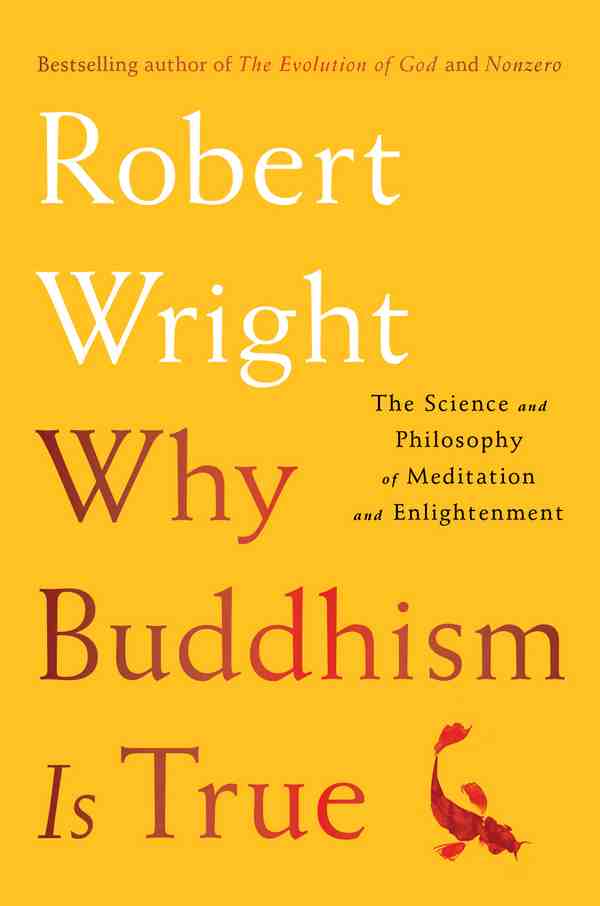“Evolutionary psychology reminds us,” says the science writer Robert Wright, “that we were not designed by natural selection to be enduringly happy or contented.” If anything, evolution has programmed us to suffer. But there is a powerful antidote, he argues: the practices of Buddhism.

“I don’t actually call myself a Buddhist, even though I do follow Buddhist meditative practice.”
Visual: Barry Munger
In his new book, “Why Buddhism Is True: The Science and Philosophy of Meditation and Enlightenment,” Wright makes a tight-knit argument that elements of the Buddhist outlook — particularly mindful meditation — can help us move away from the pursuit of gratification, which can be fleeting, and also serve as “a rebellion against natural selection.”
The book blends a history of Buddhism with descriptions of Wright’s own practice, making the case that Buddhism is not just “true” but timely — that its “diagnosis of the human predicament is fundamentally correct, and that its prescription is deeply valid and urgently important.”
Currently the visiting professor of science and religion at Union Theological Seminary in Manhattan, Wright is the author of four books, including the best-selling “The Moral Animal” and the Pulitzer Prize finalist “The Evolution of God.”
I recently caught up with Wright by phone while he was on a book tour in Boston. Among other things, we talked about why he thinks evolutionary psychology supports the Buddhist outlook, how Buddhism and a popular form of talk therapy share core philosophies about achieving inner peace, and whether Buddhism can be stripped of its more supernatural claims. Here’s our conversation, condensed and lightly edited.
UNDARK — A central assertion of Buddhism, according to your new book, is that we suffer — or perhaps, put better, aren’t satisfied — largely because we don’t see the world as clearly as we can. How does evolutionary psychology support this claim?
Robert Wright — For starters, evolutionary psychology reminds us that we were not designed by natural selection to be enduringly happy or content. In particular, gratification was basically designed to evaporate — for pretty clear reasons.
If you imagine an animal that was enduringly content after eating a meal, where it never felt the need to eat again, well, obviously that animal wouldn’t do very well in the genetic sweepstakes. Whereas an animal that eats and gets the positive reinforcement from eating, it feels satisfied for a little while, but then feels hungry again and discontented. This animal is going to do better than a contented animal in terms of natural selection. So a certain amount of dissatisfaction and suffering is built into us and other animals.
When we imagine the next great meal, or some promotion we want, or buying the next thing we’re going to buy, we usually focus on the gratification. We imagine that phase. We tend not to imagine the subsequent evaporation of the gratification. Even there you might say we’re not clearly seeing the impermanence of the gratification, and that’s a very Buddhist idea. That we don’t really grasp impermanence, generally. That’s one example of how evolutionary psychology helps explain how we’re not seeing the world clearly, and how this is connected to the suffering — or, at least, to recurring discontent.
UD — Western-style therapy like cognitive behavioral therapy also claims we often don’t see the world clearly. Can you talk about how CBT and Buddhism are related?
RW — CBT is premised on the idea that we do have illusions. It attacks them by talking the person out of them. It might address public-speaking anxiety by the therapist saying, “Now really think, what’s the worst it could realistically go? How badly could you realistically do? How bad could the implications really be for your career?” And the person might come to see that the likely outcomes aren’t really that bad.
Whereas, with mindfulness meditation, you would focus on the feeling itself. The anxiety associated with the false logic, the exaggerated apocalyptic thinking. Through meditation, you would observe the anxiety in a way that tended to undermine it, but in both cases the premise is that the anxiety is not valid. It’s in some sense illusory, and skepticism towards it is appropriate. At any rate, they are very complementary, and in fact there is such a thing as mindfulness-based cognitive behavioral therapy.
UD — Do you think that Buddhism can be decoupled from its supernatural components, such as reincarnation, nirvana, and karma?
RW — As an intellectual matter, yes. Although there is a part of Buddhism that is very much a full-fledged religion, complete with praying to deities, alongside that there has developed a very robust Buddhist philosophy and psychology — and that seems to be about as ancient as the religious part. It’s not hard to separate. If you would rather not call the purely actualistic part of Buddhism “Buddhism,” fine. That’s up to you. I don’t actually call myself a Buddhist, even though I do follow Buddhist meditative practice, and do so in the context of Buddhist philosophy — in part, because it almost seems that the religious Buddhists in Asia might find it disrespectful for people to do that. I don’t know.
To me, the label doesn’t matter. It’s certainly the case, though, that in the United States this naturalistic Buddhism has come to be called just Buddhism.
UD — And yet you do write that you believe that Buddhism has a spiritual component to it.
RW — Yeah, I mean I think it qualifies as “spiritual” by my definition of the term, but that’s not to say it has all of the religious dimensions of, say, Asian Buddhism. I don’t believe in reincarnation, for example, but still, in my view, it is spiritual. For one thing, it involves a struggle to see a reality that is deeper than surface reality, and a struggle that also has a moral dimension. Part of the Buddhist claim is that if we see reality more clearly, not only can we be happier, but we will treat other human beings better. For this, and other reasons, I do consider it a spiritual practice.
UD — You use the word “enlightenment” a lot in the book. Are there parallels between how Buddhists view enlightenment and the notion of enlightenment as seen through an evolutionary lens?
RW — From a Darwinian perspective, enlightenment could be seen as overcoming a lot of perceptual and cognitive biases that were built into us by natural selection. And I think that’s what a lot of Buddhism actually amounts to as well. Of course, in the Buddha’s day, they had no way of knowing that natural selection had built these illusions into us, but I think to a fairly large extent the illusions that Buddhists talk about overcoming, to become better and happier people, can be understood now as having been implanted in our brains by natural selection.
Eric Allen Been is a freelance writer who has contributed to The New Republic, The Atlantic, Vox, and Vice’s Motherboard, among other publications.












Comments are automatically closed one year after article publication. Archived comments are below.
Buddism is not Maditation,It is just a part or a tool for Buddish to follow to end of suffering. Meditation have both side Positive and Negative . Budda show how to…..Read Budda phylosophy from Tripitaka ,the original .
Buddism is not Maditation,It is a aprt or a tool for Buddish to follow to end of suffering. Meditation have both side Positive and Negative . Budda show how to…..Read Budda taught from Tripitaka ,the original phylosophy.
The definition of Buddhism for me. Very well said.
I really enjoyed reading this, but it wasn’t entirely new to me.
I have dipped into many a section of James Austin’s _Zen and the Brain_ (2001?) and been transformed by what I found. Backing up spiritual training with neuroscience is my cup of tea! Highly recommended for anyone wanting to read Wright’s book, too.
Gautam Budha was a Hindu and ‘Nirvana’, ‘Karma’, ‘Dhyan (Meditation)’ and ‘Punarjanm (reincarnation) are basically Hindu concepts.
AN INTRODUCTION TO BUDDHISM, by Peter Harveyp 14-5: “The republic [of the Sakka people] was not Brahmanized, and rule was by council of householdheads, perhaps qualified by age or social standing. Gotama was born to one of these rulers, so that he described himself as a Ksatriya when talking to Brahmins, and later traditions saw him as the son of a king.”
THERAVADA BUDDHISM by Richard Gombrich (49-50): “Buddha came from a community called (in Sanskrit) Sakyas . . . This fact is of great historical importance, because according to the Buddha … he modeled the organization of his Sangha on that of such a communities as his own. Historians usually call these communities ‘tribes’, but I am wary of that term, which corresponds to no word in Sanskrit or Pali. ‘Tribe’ evokes an isolated community with no socially structured inequailty. The Sakyas seem not to have had a varna [color/caste] system but they did have servants. They were isolated to the extent that were self-governing, and their polity was a form not envisaged in brahminical theory.”
When we have not looked for ourselves what is true, our assumptions are false!
Chidambra: The Buddha was initially influenced by Hindu teachers from whom he learned how to calm his mind and go into deep calm mind-states. The Hindus thought that this was enlightenment. But the Buddha felt that there has to be something beyond calming the mind, because these calm states are only temporarily and besides he had many unanswered questions. This lead him to a ‘quest for truth’ where he strived for many years – this eventually lead him to understood the nature of the mind (consciousness) which he described in great detail. Hindus may have incorporated this teaching to their own understanding later on in history. However, I find Hindu teachings are often presented using vague terms and abstract language. Buddhist teachings on the other hand are very straightforward and also do not make any assumptions – therefore, they can be understood by anyone who has an open mind.
Great. This while Buddhists are ethnically cleansing the Rohingya. Very enlightened.
Tyler, That’s where you go? Open your mind, don’t slam the door.
Hi Tyler: The Buddha made it clear that one doesn’t become a Buddhist merely by the label. Even for monks, he said that merely wearing robes does not fulfill the role of being a monks. So, if someone is not trying to protect the five precepts – the person cannot even be called a “Buddhist.” The following stanza from the sutras makes it clear that it is the ACTIONS that are important:
“Birth makes not a man an outcast,
Birth makes not a man a brahmin;
Action makes a man an outcast,
Action makes a man a brahmin.”
(Sutta-nipata, 142)
Regarding decoupling Buddhism from things like reincarnation, nirvana and karma: this is not necessary because all this can be clearly understood within the descriptions of ‘consciousness’ in Buddhism. Check out the article titled “Theoretical Foundations to Guide Mindfulness Meditation: A Path to Wisdom.” Current Psychology (2017). MindRxiv research repository article link: https://mindrxiv.org/mfs63/
I agree, KDN. I have developed a little experimental knowledge of what you are saying and have read collaborating explanations from several different authors and teachers. It is awfully difficult to explain it to others.